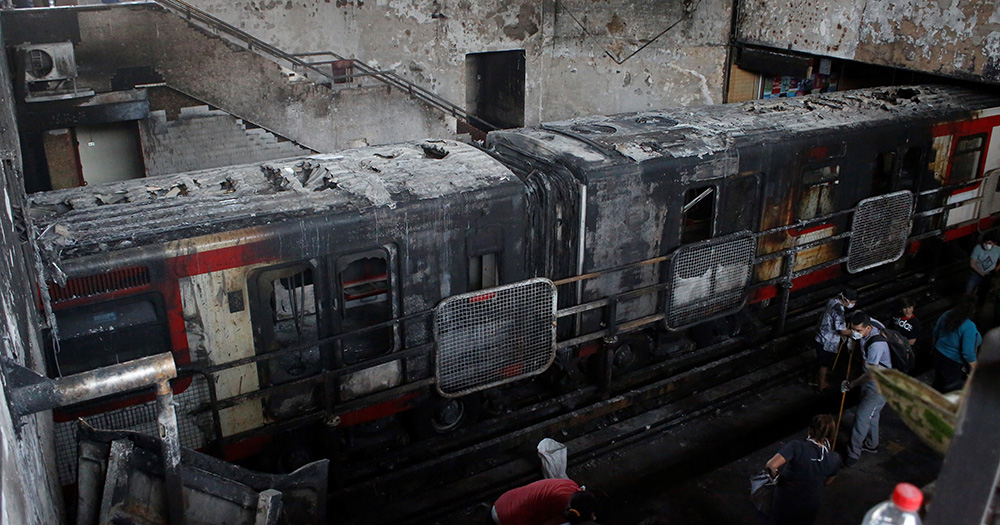A subway fare hike of 30 Chilean pesos (S$0.05) in the Chilean capital of Santiago has been suspended after it sparked violent protests that has currently left at least eight people dead, Aljazeera reported.
Reuters reported that the protests brought the capital to a halt over the weekend, with the subway shut, flights grounded, multiple sporting and cultural events cancelled, and schools closed for Oct. 21 and 22.
Fare-dodging protest that escalated into violence
The Santiago Times highlighted that the unrest first began as a fare-dodging protest by students on Oct. 14, in which they jumped over or dipped under turnstiles at the subway stations to avoid the fare increase.
However, it subsequently escalated into greater violence by the end of the week, with students breaking gates and glass, and hurling debris onto the rails.
The headquarters of the country's main electricity company, Enel, and multiple subway stations were also set ablaze.
Chile: Violent protests against metro fare hikes have led to buildings and metro stations being set on fire pic.twitter.com/SVhPQLC0We
— Natasha Fatah (@NatashaFatah) October 19, 2019
Chile: Enel (electricity company) building is on fire in Santiago, following another day of protests against the constant increase in public transportation fares. https://t.co/unNrOozbfa
— Camila (@PrensaCamila) October 19, 2019
https://twitter.com/MohamedHemish/status/1186021922385072139
#ChileDesperto This is San Paolo station, the day after. Numerous supermarkets, metro stations and shops will be in similar conditions tomorrow. The level of destruction is incredible, with soldiers nowhere to be seen. Still, so many peaceful protests out there. pic.twitter.com/gM4Dz5Sido
— Boris van der Spek (@BorisvanderSpek) October 20, 2019
The BBC further reported that five of the eight deaths were the result of a garment factory being torched, while another three deaths were the result of a fire in a supermarket.
Pinera added that in total, over 78 of Santiago's 136 subway have been damaged or burnt, Deutsche Welle reported.
State of emergency declared
On Oct. 18, a state of emergency was declared by Chilean President Sebastian Pinera, The Santiago Times further reported.
Reuters stated that up to 10,500 military and police personnel have been deployed within Santiago, marking the first time that the military has patrolled the streets since the dictatorship of Augusto Pinochet, from 1973 to 1990.
Pinera further condemned the violence and characterised the perpetrators of the riots as a "powerful enemy", stating, "We are at war against a powerful enemy, who is willing to use violence without any limits."
He also urged unity in tackling the violence, saying: "Today is not the time for ambiguities. I call on all my compatriots to unite in this battle against violence and delinquency."
As of Oct. 20, up to 1,462 people have been arrested across the country, with 614 of them detained within Santiago alone.
The straw that broke the back of discontent
In another report, Reuters noted that the protests also drew in Chileans from both rich and poor neighbourhoods, in order to express a larger discontent over the rising cost of living and inadequate public services.
Boris Van Der Spek, the founder of the independent news website Chile Today, told Aljazeera that the protest against the fare hike was emblematic of the discontent in the country at the level of inequality.
He said, "The protests are more than just about fare increase. It is about the cost of living and the level of inequality in the country. There is so much discontent in Chile. This was always going to happen one way or another."
A host of issues affecting Chilean public services
The healthcare and education industries are largely privatised in Chile.
Additionally, payments from the country's Pinochet-era pension system have fallen below the level of the country's minimum wage salary, leaving many retirees in poverty, Deutsche Welle reported.
Subway officials have stated that the hike was necessary, given the rising cost of fuel and the devaluation of the country's currency.
The Santiago Times further highlighted that Chile's need to import fuel has resulted in the country having some of the most expensive public transportation fares in South America.
Top photo by Sebastian Brogca/Anadolu Agency via Getty Images
If you like what you read, follow us on Facebook, Instagram, Twitter and Telegram to get the latest updates.
